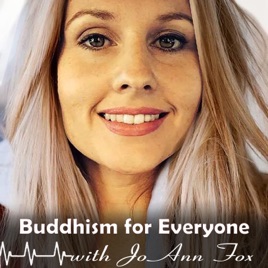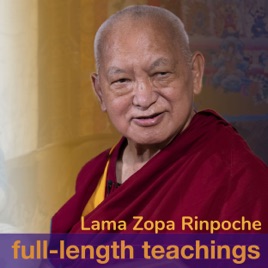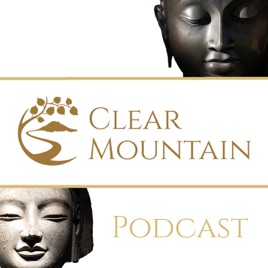
Advertise on podcast: Buddhism for Everyone with JoAnn Fox
Rating
4.9 from
Country
This podcast has
189 episodes
Language
Publisher
Explicit
No
Date created
2018/11/07
Average duration
36 min.
Release period
15 days
Description
Buddhism for Everyone with JoAnn Fox is a weekly podcast that shares how to put the teachings of Buddhism into practice to be happier, more peaceful, or to become the spiritual warrior this world so desperately needs. JoAnn Fox has been teaching Buddhism for 17 years and does so with kindness and humor.
Podcast episodes
Check latest episodes from Buddhism for Everyone with JoAnn Fox podcast
Episode 191
2024/02/21
Episode 190 - Renunciation: This is the way
2024/02/02
In today's episode, we explore the profound concept of renunciation in Buddhism. True renunciation isn't about abandoning pleasure but transforming our relationship with it. Join us as we unravel the complexities of renunciation and explore a path to genuine contentment.
Renunciation is the wish to break free from the cycle of suffering (samsara) by overcoming our deeply ingrained mental habits of ignorance and attachment. We begin by realizing the futility of expecting lasting satisfaction from transient phenomena (material things, people, opinions, expectations of others, etc.)
Renunciation, therefore, is not a denial of happiness but a liberation from the cycle of suffering caused by our grasping, exaggerating, and distorting attitude toward pleasure and happiness.
Renunciation creates a profound shift in perspective where we no longer rely on sensory pleasures for happiness. When we realize renunciation, we awake to an unlimited, internal source of happiness.
Whoever, having cut off every fetter,
Does not tremble,
Is unbound and beyond attachment,
I call a brahman
--Buddha, The Dhammapada (Verse 397)
References with Links
Buddha (1986).The Dhammapada: Verses and Stories. Translated by Daw Mya Tin, M.A. (Website). Edited by Editorial Committee, Burma Tipitaka Association Rangoon. Courtesy .of Nibbana.com. For free distribution only, as a gift of dhamma. Retrieved from https://www.tipitaka.net/tipitaka/dhp/verseload.php?verse=396
Je Tsongkhapa (2014). Great Treatise on the Stages of the Path to Enlightenment, by Je Tsongkhapa, Volume 1 (Kindle). Translated by the Lamrim Chenmo Translation Committee. Joshua Cutler, Editor-in-Chief, and Guy Newlan, Editor.
Find us at the links below:
Website: BuddhismforEveryone.com
Facebook: https://www.facebook.com/Buddhismforeveryone
Podcast Facebook Group: Join our private group at:https://www.facebook.com/groups/sanghatalk/
Instagram: https://www.instagram.com/buddhism.with.joann.fox
Donate through Paypal: https://www.paypal.com/donate/?hosted_button_id=5XPAHDDMJGD7S
more
Episode 189 - Transforming the Three Poisons
2024/01/21
In this episode, we explore the antidotes to the three poisons — greed, anger, and ignorance. The three poisons are the fundamental sources of suffering. Join us to discover how generosity counters greed, loving-kindness conquers anger, and the realization of emptiness opposes ignorance. Explore the transformative power of applying ancient wisdom to today's busy life.
Anger blinds individuals to compassion and disrupts our inner peace. Anger is also the most potent destroyer of good karma. Greed, or attachment, arises from the craving for possessions, experiences, or people. Attachment leads to a perpetual cycle of desire and dissatisfaction. Ignorance is a lack of understanding of the true nature of reality, which causes the poisons of anger, attachment, and all other delusions, such as jealousy, pride, etc. Overcoming these three poisons through mindfulness, wisdom, and ethical conduct is crucial for attaining enlightenment and freeing oneself from cycles of suffering.
The three mental poisons explained by Buddha:
ignorance
attachment (also called craving)
anger (also called hatred or ill will)
The practices that act as antidotes to the three mental poisons:
Wisdom opposes ignorance
Generosity opposes attachment
Loving-kindness opposes anger
Generosity opposes Greed/Attachment
Giving without expecting something in return loosens the grip of attachment (also referred to as greed or craving in Buddhism). Attachment arises from a misperception of scarcity. We may think we don't have enough love, money, success, beauty, etc., to be happy. The belief that there's not enough leads us to cling to possessions, relationships, or experiences out of fear of lacking. Generosity changes this perception of scarcity in several ways.
Generosity is a powerful antidote to attachment by helping us accept impermanence, cultivate gratitude, and embrace simplicity. Through these practices, we transform our relationship with material possessions and move towards a simpler and more content way of life.
Loving-kindness Opposes Anger
Hatred, or aversion, is rooted in the delusion that some people or groups are separate from us. This can be remedied with the practice of loving-kindness, or metta. By consciously cultivating goodwill for both ourselves and our “enemies,” we neutralize the impact of this poison and open a space in which we can become aware of the true roots of hatred in our own wounds. As James Baldwin said, “One of the reasons people cling to their hates so stubbornly is because they sense, once hate is gone, they will be forced to deal with pain.”
Wisdom Realising Emptiness Oppeses Ignorance
The cultivation of wisdom, particularly the realization of emptiness (Shunyata), stands in opposition to ignorance. Ignorance is the root cause of suffering (dukkha). The cultivation of wisdom realizing emptiness opposes ignorance by challenging misconceptions about the nature of reality. Embracing the concept of emptiness leads to an understanding of interdependence, the impermanent nature of all phenomena, and the absence of inherent existence. This wisdom is a transformative force that liberates us from the cycle of suffering.
I do not call him a brahmana just because he is born from the womb of a brahmana mother.
He is just a bhovadi brahmin if he is not free from moral defilements.
Him I call a brahmana, who is free from moral defilements and from attachment. (Verse 396)
--Buddha, the Dhammapada
References with Links
Buddha (1986).The Dhammapada: Verses and Stories. Translated by Daw Mya Tin, M.A. (Website). Edited by Editorial Committee, Burma Tipitaka Association Rangoon. Courtesy .of Nibbana.com. For free distribution only, as a gift of dhamma. Retrieved from https://www.tipitaka.net/tipitaka/dhp/verseload.php?verse=396
Je Tsongkhapa (2014). Great Treatise on the Stages of the Path to Enlightenment, by Je Tsongkhapa, Volu
more
Episode 188 - Practicing Impermanence
2024/01/04
Buddha's teachings on impermanence empower practitioners to develop a mindset far less prone to suffering, anxiety, and worry. By embracing the ever-changing nature of existence, we create a wise and resilient approach to life's challenges. In this episode, listeners are encouraged to apply impermanence to something causing them to suffer.
Practical ways to apply impermanence to alleviate our suffering:
Accepting Change:
Impermanence teaches that all phenomena are transient and subject to change. Nothing in this world--including our emotions, relationships, material possessions, self, and others--is permanent. Accepting this constant flux can help us let go of attachments and unrealistic expectations.
Reducing Attachment and Clinging:
Attachment often leads to suffering when those attachments change or cease to exist. Understanding that everything is impermanent makes us less likely to cling to things, people, or situations. We can also remember the truth of impermanence to reduce attachment to something we want, or this truth can help us let go. Embracing impermanence creates a relaxed, accepting attitude toward life and other people. Wouldn't that be great!?
Coping with Loss:
Like Kisagotami in her famous story, recognizing that loss is a natural part of life can help us cope with death and other forms of separation. See if a gentle understanding that death is a part of life eases the pain. Buddha also said that every meeting ends in parting; does accepting this truth help?
Living in the Present:
Impermanence emphasizes the importance of living in the present moment. Since the past is gone and the future is uncertain, focus on the present moment to fully experience and appreciate the richness of life. Focusing on the present moment can also keep us from being preoccupied with the past or what might happen.
Easing Anxiety and Worry:
Anxiety often arises from fear of the unknown or concerns about the future. Impermanence teaches that the future is inherently uncertain and that worrying about it is futile. To find some relief from anxiety, try to embrace the present moment and let go of excessive concern about the future.
Understanding the Nature of Life:
Impermanence is closely tied to the First Noble Truth, which states that life is inevitably marked by suffering. Recognizing the impermanent nature of pleasurable and painful experiences can help us accept that suffering is a part of the human condition and that it's also impermanent.
Encouraging Equanimity:
Impermanence fosters the development of equanimity, the ability to remain calm and balanced in the face of life's ups and downs. When we understand that both joy and suffering are temporary, there is a greater capacity to face challenges with resilience and inner peace.
Him I call a brahmana who wears robes made from rags (picked up from a dust heap), who is lean with veins standing out, who meditates alone in the forest. Verse 395
—Buddha, The Dhammapada
References with Links
Buddha (1986).The Dhammapada: Verses and Stories. Translated by Daw Mya Tin, M.A. (Website). Edited by Editorial Committee, Burma Tipitaka Association Rangoon. Courtesy of Nibbana.com. For free distribution only, as a gift of dhamma. Retrieved from https://www.tipitaka.net/tipitaka/dhp/verseload.php?verse=395
Find us at the links below:
Website: BuddhismforEveryone.com
Facebook: https://www.facebook.com/Buddhismforeveryone
Facebook Group: Join our private group at:https://www.facebook.com/groups/sanghatalk/
Instagram: https://www.instagram.com/buddhism.with.joann.fox
more
Episode 187 - Cleaning up bad karma
2023/12/27
There is a way to purify negative karma! Phew. Buddha taught the Four Powers of Purification as a method to purify the negative karma we’ve created in the past. The powers of purification act together or alone. For example, as soon as we have even a moment of regret for some harm we’ve done, we start to purify that karma. However, to fully purify negative karma form previous actions, the four powers can be used as a meditation. This practice illuminates Buddhism’s most essential tenet: that we can profoundly change--and even become a completely pure, enlightened being.
How to purify negative karma through the Four Powers:
1. Regret
2. Reliance
3. Remedy
4. Resolve
The Power of Regret
The first power is healthy regret. This type of regret stands in contrast to guilt. Guilt is anger towards oneself. It makes us feel bad about ourselves. Regret, however, understands we acted out of delusions like anger, jealousy, pride, or greed, but our nature remains pure and good. A mind of regret wants to be free of these delusions like getting poisons out of ourselves. Regret makes us naturally desire not to repeat that action and the harm we caused.
The Power of Reliance
To understand the power of reliance, imagine that making a mistake is like falling down on the ground. Just as we depend on the ground to stand up again, when we cause harm, we can purify it only by depending on the two types of beings we harmed: the Buddha (who is a wise guide, like a doctor) and ordinary living beings.
First, we rely on the Buddha by following his teachings to become better. If you're not a Buddhist, you can still do something similar. You could renew your commitment to follow the advice of someone you admire, or dedicate yourself again to good things you want to do. You can practice reliance in the meditation on the four powers by asking a higher power for help, like praying to Jesus or asking Buddha for help to purify. Second, we rely on other living being by developing compassion and love for them.
3. The Power of Remedy
This refers to the power of applying remedies. In this step, we need to do something positive to counteract the negative energy we created, JoAnn Fox shares a traditional method for applying remedies by reciting the mantra of Vajrasattva, Buddha of Purification (see the mantra below.)
If you feel comfortable visualizing an enlightened being, you can visualize a figure such as Buddha or Vajrasattva above your head. You can visualize Buddha as you’ve seen him depicted or simply as a being made of golden light. Vajrasattva can be imagined in a simple way as a being of white light. While reciting the mantra, imagine light flowing down from the holy being at your crown. The light flows down, through the crown of your head, and fills your entire body purifying all your negative karma and delusions.
If you do not feel comfortable visualizing such a being, you can imagine a sphere of light above your head, thinking that it represents all enlightened qualities like love and compassion. Visualize light flowing down from the sphere and filling you.
The short Mantra of Vajrasattva, Buddha of Purification
Om Vajra Sattva Hum
4. The Power of Resolve
The power of resolve (sometimes called the power of promise) involves a promise to try to refrain from a harmful action in the future. If you’re trying to purify a specific negative action, it can be especially meaningful to refrain from an action that is similar to that original harmful action. For example, if you’re trying to purify stealing, you can promise to refrain from stealing in the future. Alternatively, you can decide to act in more positive ways, such as being more generous or promising to donate to a charity.
“First, if all the causes and conditions for something to occur come together and there is nothing opposing its arising, the effect is certain to occur. For example, if a barley seed (the cause) is planted, t
more
Episode 186 - Change your view and everything changes
2023/12/05
Within Tibetan Buddhism, Buddhists are sometimes referred to as "inner beings." What this means is that we turn inward. We learn to cultivate happiness and solve problems by changing our thoughts and actions. Like a sculptor with clay, our mind shapes our experiences. By observing thoughts, feelings, and habits, we gain insight into the workings of the mind. With this awareness, we can transform mental mental states to alleviate suffering.
Understanding that the source of a problem is inside a person doesn't imply blame but highlights our potential for growth and transformation. Recognizing internal causes allows us to engage in practices like mindfulness and meditation to address the root of problems and make real change.
For example, the mind of anger distorts the way a person appears to us. Anger makes a person we normally love seem full of faults and unpleasant. Seeing our loved one through the lens of anger, causes us to see an enemy. By understanding the nature of anger and that its causes are thoughts, feelings, and the habit of anger, we can change these inputs. We could change our angry thoughts that focus on their faults to thoughts of appreciation for them. We can change our feeling to one of compassion for them. Ultimately, through practice, we can change our underlying habit of anger and live in a much more peaceful world. This process holds true for all our habits of mind. When we accept responsibility for our actions, feelings, and mental states, we take a huge step towards addressing the root causes of our problems.
Not by matted hair, not by clan,
Not by birth does one become a brahmin.
The one in whom there is truth and Dharma
Is the one who is pure, is a brahmin (Fronsdale, 2011)
—Buddha, The Dhammapada, Verse 393
References with Links
Buddha.The Dhammapada. Translated by Gil Fronsdale. (Kindle). Shambala, Boston and London, 2011, pp. 78 (Link)
Buddha (1986).The Dhammapada: Verses and Stories. Translated by Daw Mya Tin, M.A. (Website). Edited by Editorial Committee, Burma Tipitaka Association Rangoon. Courtesy .of Nibbana.com. For free distribution only, as a gift of dhamma. Retrieved from https://www.tipitaka.net/tipitaka/dhp/verseload.php?verse=393
Find us at the links below:
Facebook: https://www.facebook.com/Buddhismforeveryone
Facebook Group:Join our private group at: https://www.facebook.com/groups/sanghatalk/
Instagram: https://www.instagram.com/buddhism.with.joann.fox
Website: Buddhismforeveryone.com
more
Episode 185 - How to Transform through Buddha's Teachings
2023/11/29
Learning how to listen to teachings and having respect for the teacher create the right conditions for your mind to change. In this episode, we explore Je Tsongkhapa’s instructions on “How to listen to the teachings by relying on the Six Ideas. Your mind opens when you feel the teaching is medicine that can cure your specific suffering or difficulty. Buddhist Teacher JoAnn Fox explains how to put these instructions into practice with some struggle you're currently experiencing.
When you receive Buddhist teachings in a formal setting and see the teacher being prostrated before or given gifts, it may seem strange in our modern world. Respect for the teacher, however, is a cause. The effect is that your mind opens to the meaning behind the words and their value to your life. Therefore, respect for the teacher and teachings is a condition for transformation to happen. When you pay homage or make offerings, it shows that you believe it’s precious.
How to listen to the Teachings by relying on the Six Ideas
Think of yourself as a sick person.
“Stricken with the virulent and chronic disease of the three mental poisons [attachment, hostility, and ignorance], we are extremely sick, but we are completely unaware that we are ill.”
Think of the instructor as a doctor.
Think of the teachings as medicine.
Think of sincere practice as the way to cure your disease.
Think of the Buddhas as excellent beings.
Wish that the teaching will endure for a long time (Je Tsongkhapa, 2014).
If from somebody one should learn the Teaching of the Buddha, he should respectfully pay homage to that teacher, as a brahmin worships the sacrificial fire. (Verse 392)
—Buddha, The Dhammapada
References with Links
Buddha (1986).The Dhammapada: Verses and Stories. Translated by Daw Mya Tin, M.A. (Website). Edited by Editorial Committee, Burma Tipitaka Association Rangoon. Courtesy .of Nibbana.com. For free distribution only, as a gift of dhamma. Retrieved from https://www.tipitaka.net/tipitaka/dhp/verseload.php?verse=392
Je Tsongkhapa (2014). Great Treatise on the Stages of the Path to Enlightenment, by Je Tsongkhapa, Volume 1 (Kindle). Translated by the Lamrim Chenmo Translation Committee. Joshua Cutler, Editor-in-Chief, and Guy Newlan, Editor, pg 58-63.
Find us at the links below:
Facebook: https://www.facebook.com/Buddhismforeveryone
Facebook Group:Join our private group at: https://www.facebook.com/groups/sanghatalk/
Instagram: https://www.instagram.com/buddhism.with.joann.fox
Website: Buddhismforeveryone.com
more
Episode 184: The Art of Ethical Living
2023/11/11
This episode explores the art of ethical living, guided by the practice of restraint. Restraint involves intentionally moderating and controlling one's actions, speech, and thoughts. We cultivate restraint to minimize the harm we cause and to build the foundation for spiritual development. A good guide for our practice of restraint is the Five Precepts. The Five Precepts were given to his lay (not ordained) followers as ethical guidelines that include the vow to abstain from killing, stealing, engaging in sexual misconduct, lying, and becoming intoxicated.
How to practice the ethical discipline of restraint:
Generate the motivation to practice restraint with some action
Decide we're going to do it
Use mindfulness to remember that we've decided to practice restraint
Put this decision into practice
Whoever does no ill
Through body, speech, and mind,
And is restrained in these three areas,
I call a brahmin. (Verse 391)
--Buddha, The Dhammapada
Reference with Link: Buddha.The Dhammapada. Translated by Gil Fronsdale. (Kindle). Shambala, Boston and London, 2011. (Link)
Find us at the links below:
Facebook: https://www.facebook.com/Buddhismforeveryone
Facebook Group: Join our private group at: https://www.facebook.com/groups/sanghatalk/
Instagram: https://www.instagram.com/buddhism.with.joann.fox
Website: Buddhismforeveryone.com
more
Episode 183 - How to prevent anger
2023/11/11
This episode explores the question “Where does anger come from?” Buddhist teacher, JoAnn Fox, also provides several practical ways to prevent anger from arising (when it typically would)!
Anger doesn’t come from another person or a situation. Anger comes from our thoughts. Specifically, when we pay inappropriate attention to an unpleasant object and dwell on its faults, we work ourselves up until anger arises. That point at which anger is manifest is when the mind is unpeaceful and uncontrolled.
A very sad aspect of anger is that this mental state has the wish to harm. The intention to harm is the nature of anger, just as the nature of fire is to burn. We don’t want to harm those we love and cherish, but when we’re angry that mind wants to harm them. That makes Buddha’s advice to turn “ away from the intent to harm” and not “set anger loose” so important for all our relationships.
The first step in solving an anger problem is to admit we have one and decide we must do something about it. Lama Zopa Rinpoche gave this advice to a person who worked as a driver for a Dharma center. The driver complained of being very angry with his family and asked Rinpoche for some mantras to help him. Lama Zopa’s response began:
“My dear one,
You have recognized that anger arising is not good and that you must do something about it. You’re responsible for stopping that problem. Even this is progression toward peace and happiness.”
How beautiful and powerful is this first discovery and the wish to change!
One should not strike a brahmin
And a brahmin should not set [anger] loose.
Shame on the one who hits a brahmin
And greater shame on the one who sets [anger] loose. (389)*
For the brahmin, nothing is better
Than restraining the mind
From what it cherishes.
Whenever one turns away from the intent to harm,
Suffering is allayed. (390)
—Buddha, The Dhammapada
Reference with Link
Buddha.The Dhammapada. Translated by Gil Fronsdale. (Kindle). Shambala, Boston and London, 2011, pp. 78 (Link)
Find us at the links below:
Facebook: https://www.facebook.com/Buddhismforeveryone
Facebook Group: Join our private group at: https://www.facebook.com/groups/sanghatalk/
Instagram: https://www.instagram.com/buddhism.with.joann.fox
Website: Buddhismforeveryone.com
more
Episode 181 - Radiating Compassion
2023/10/07
The primary motivation behind wanting to become a Buddha for the sake of all living beings is boundless compassion. This unconditional love and concern for the well-being and liberation of all sentient beings, without exception, takes effort to cultivate.
A bodhisattva is someone who, out of compassion, vows to attain enlightenment for the benefit of all beings. The wish itself is called "bodhicitta." What marks becoming a bodhisattva is that their intention to become a Buddha is unmovable (meaning they've developed bodhicitta).
While the Bodhisattva Vow is central to the Mahayana Buddhist tradition, this aspiration to become a Buddha transcends cultural, religious, and philosophical boundaries. It is a universal call to alleviate suffering for all living beings, regardless of their background or beliefs. Some may view the aspiration to become a Buddha as a sacred duty, a calling that arises from a deep sense of responsibility towards all living beings and the world as a whole.
The practice of Taking and Giving, or Tonglen, is a powerful method for cultivating compassion and ripening bodhicitta. It does so by developing empathy, erasing boundaries between self and other, transforming negative mental states, and deepening one's commitment to the welfare of all beings. Through consistent practice, we can gradually mature in our capacity for selfless love and compassion.
By day shines the sun;
by night shines the moon;
in regalia shines the king;
in meditation shines the arahat;
but the Buddha in his glory shines at all times,
by day and by night. Verse 387
—Buddha, The Dhammapada
References and Links
Buddha.The Dhammapada. Translated by Gil Fronsdale. (Kindle). Shambala, Boston and London, 2011, pp. 78 (Link)
Buddha (1986).The Dhammapada: Verses and Stories. Translated by Daw Mya Tin, M.A. (Website). Edited by Editorial Committee, Burma Tipitaka Association Rangoon. Courtesy .of Nibbana.com. For free distribution only, as a gift of dhamma. Retrieved from https://www.tipitaka.net/tipitaka/dhp/verseload.php?verse=386
Find us at the links below:
Facebook: https://www.facebook.com/Buddhismforeveryone
Facebook Group:Join our private group at: https://www.facebook.com/groups/sanghatalk/
Instagram: https://www.instagram.com/buddhism.with.joann.fox
Website: Buddhismforeveryone.com
more
Episode 180 - Practicing Kindness Toward Ourselves
2023/09/23
Metta meditation, also known as loving-kindness meditation, is a fundamental practice in Buddhism that cultivates feelings of love, compassion, and goodwill towards oneself and others. The word "Metta" is a Pali term that translates to "loving-kindness" or "benevolence."
In this meditation, practitioners typically sit in a comfortable position and focus on generating feelings of love and kindness. The practice involves silently repeating phrases or affirmations that express well-wishes, such as "May you be happy, may you be healthy, may you be safe, may you live with ease."
The meditation progresses through stages, starting with sending loving-kindness to oneself, then extending it to loved ones, people we're neutral toward, and then to those we feel aversion or anger toward. The ultimate aim is to cultivate a boundless, unconditional love for all sentient beings. It also fosters a sense of interconnectedness and reduces emotions like anger and indifference.
Metta meditation is considered a powerful tool for developing compassion, empathy, and universal love and compassion. It is practiced in various forms across different Buddhist traditions. People from diverse backgrounds also use Metta meditation for its universal message of love and goodwill.
In this episode, we practice only the first round of the metta mediation, practicing loving-kindness toward ourselves:
May I be well
May I be happy
May I be peaceful
Whoever is
Seated, absorbed in meditation,
Done what had to be done,
Free of contaminants,
Who has reached the highest goal,
I call a brahmin. (386)
—Buddha, The Dhammapada
—Buddha, The Dhammapada.
References and Links
Buddha.The Dhammapada. Translated by Gil Fronsdale. (Kindle). Shambala, Boston and London, 2011, pp. 78 (Link)
Find us at the links below:
Facebook: https://www.facebook.com/Buddhismforeveryone
Facebook Group:Join our private group at: https://www.facebook.com/groups/sanghatalk/
Instagram: https://www.instagram.com/buddhism.with.joann.fox
Website: Buddhismforeveryone.com
more
Episode 179 - Work with your greatest afflictions first
2023/09/13
The Lojong slogan "Work with your greatest defilements first" emphasizes the importance of addressing the negative habit that is most deeply disturbing our inner peace and happiness. Lojong, which means "mind training" in Tibetan, is a set of teachings in Tibetan Buddhism aimed at developing compassion, wisdom, and the ability to transform adverse circumstances into opportunities for spiritual growth. Central to Lojong are short, pithy instructions called "slogans," like "Work with your greatest defilements first." By working with the habit that causes us the most problems first, we can make significant strides in our quest for peace and happiness.
In Buddhism, defilements (or kleshas in Sanskrit) refer to mental states that cloud the mind and lead to suffering. Sometimes called delusions or afflictions, common defilements include greed, anger, ignorance, pride, and jealousy.
Tackling our greatest defilement first helps us in two ways. First, we can open up so much more peace and joy in our lives. We also remove a major obstacle to spiritual growth. This approach acknowledges that we all have deeply ingrained habits that hinder our progress toward liberation and mental peace. It takes courage and vulnerability to take responsibility like this, especially if it’s creating a big mess in our lives or affecting others.
How to work with your greatest defilements first
The practice starts with self-awareness. We identify the habit causing us the most difficulties or suffering. Perhaps it is a delusion like jealousy that is currently very strong, like a thorn raking through our hearts. Or it is a habit that frequently bothers us. Through mindfulness, we observe how the habit is triggered. We also try to understand the consequences it brings.
Once revealed through mindfulness and self-reflection, our greatest defilement can then become a target, something we gradually work on as we gather spiritual tools. If it’s anger, for example, one can find Buddhist teachings focusing on anger or seek therapy to address it. Several episodes of this podcast are dedicated to working on anger, for example. We can't expect to solve our greatest defilement right away. However, we take a huge step toward peace just by becoming aware and taking responsibility for it.
Him I call a brahmana who has for him neither this shore (i.e., the sense-bases)
nor the other shore (i.e., the sense objects ),
and who is undistressed
and free from moral defilements. (Verse 385)
--Buddha, The Dhammapada
Links to References
Buddha (1986).The Dhammapada: Verses and Stories. Translated by Daw Mya Tin, M.A. (Website). Edited by Editorial Committee, Burma Tipitaka Association Rangoon. Courtesy .of Nibbana.com. For free distribution only, as a gift of dhamma.
https://www.tipitaka.net/tipitaka/dhp/verseload.php?verse=385
Find us at the links below:
Facebook:https://www.facebook.com/Buddhismforeveryone
Facebook Group:Join our private group at: https://www.facebook.com/groups/sanghatalk/
Instagram: https://www.instagram.com/buddhism.with.joann.fox
Website: Buddhismforeveryone.com
more
Podcast reviews
Read Buddhism for Everyone with JoAnn Fox podcast reviews
Boydstunm
2023/11/30
Excellent explanations
JoAnn makes Buddhist principles easy to understand and demonstrates how they apply to contemporary situations.
Tony D853
2023/04/28
Thank you
Your podcast helped me through the most challenging phase of my life. I well up with tears when I hear your voice and think about those dark days. ...
more
HeatherRyan108
2023/04/25
Buddhism I can relate to
This is one of my favorite podcasts! Joann is so relatable, funny, a great teacher, and just someone you can imagine yourself being friends with. Befo...
more
HIwilma
2023/02/13
Absolutely delightful
JoAnn explains Buddhist concepts in such a delightful way. She’s wise and funny and relatable. I love when she brings her dogs into the stories and ex...
more
redsiberian
2022/12/15
Happiness Inducing
As someone who only recently discovered the personal relevance and potential of Buddhism, I find JoAnn’s conversational and light approach to the subj...
more
Kanewma
2022/09/10
Joann is a gift to this earth!
Joann is extremely knowledgeable and keeps it real. She is truly helping to make this world a better place with her work. I look forward to listening ...
more
janetl718
2022/07/10
JoAnn is the BEST!!!
This podcast and JoAnn’s teachings have been life changing for me. She makes it so that it is easy to follow along and understand. Her voice is pleasa...
more
Brooke knight nj
2022/06/14
I’ve learned so much!
JoAnn is AMAZING! I’ve learned so much about myself, about why I do the wrong things in certain situations and most importantly JoAnn has taught me ho...
more
Vickie Fox
2022/02/25
Great life skills
JoAnn is amazing at really breaking down the message and bring it to how you can use the teachings every day. I am so glad to have found this podcast!
DwightTee
2022/02/02
Life advice for everyone
JoAnn's animated and down to earth teaching style make the teachings of the Buddha relevant and understandable to everyone in today's world. You don't...
more
Podcast sponsorship advertising
Start advertising on Buddhism for Everyone with JoAnn Fox & sponsor relevant audience podcasts
You may also like these buddhism Podcasts

4.7
25
38
Buddhism for Beginners
Kunzang Palyul Choling - Jetsunma Ahkon Lhamo

5
23
1215
Blue Lotus Buddhist Temple Podcast
Blue Lotus Buddhist Temple

5
29
894
Ajahn Amaro Podcast by Amaravati
Amaravati Buddhist Monastery

4.8
65
50
Hardcore Zen
hardcorezen

5
5
67
Lama Zopa Rinpoche full length teachings
Lama Zopa Rinpoche

4.8
16
122
Third Eye Talks
Naz Rose

5
8
16
Insight Meditation Society - Retreat Center: dharma talks and meditation instruction
via dharmaseed.org

0
0
41
TANTRA: The Rebel Path
Kimhye & Lucas

4.9
39
345
Dharma Talks at Columbus KTC
Columbus KTC

5
16
100
Clear Mountain Monastery
www.clearmountainmonastery.org



